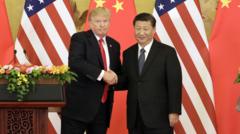High-level trade officials from the US and China are set to meet in Switzerland this weekend, marking their first talks since the escalation of tariffs in January. Both nations are under economic strain, leading to a pivotal moment for negotiations that could reshape trade dynamics.
US-China Trade Talks Resume Amidst Economic Pressures

US-China Trade Talks Resume Amidst Economic Pressures
As the US and China engage in critical discussions, the economic climate for both nations is prompting a renewed focus on trade relations.
Article text:
The world is witnessing a significant shift as the US and China prepare to engage in trade talks in Switzerland, a meeting that comes amid escalating economic tensions and high tariffs. This will be the first high-level dialogue since the trade war intensified when US President Donald Trump implemented tariffs in January, prompting retaliatory measures from Beijing and igniting a cycle of levies that now includes US tariffs on Chinese goods at 145% and Chinese duties on US exports of 125%.
Both countries have recently expressed a renewed interest in breaking the impasse, but the question remains: who will yield first? According to Stephen Olson, a senior fellow at Singapore's ISEAS-Yusof Ishak Institute and a former US trade negotiator, the timing of these talks reflects a mutual understanding that both nations can advance without showing signs of capitulation. Chinese officials have asserted that the discussions are initiated at the request of the US, indicative of their willingness to negotiate on behalf of domestic businesses.
Interestingly, the backdrop to this meeting coincides with President Xi Jinping's visit to Moscow. His presence at a significant parade in Russia highlights China's growing alliances and its desire to assert itself as a formidable global leader amidst ongoing trade tensions with the US. This positioning is essential for China as it heads to the negotiating table, emphasizing its strategic clout.
During the month of April, the economic ramifications of the tariffs have been evident, with a marked decline in manufacturing activity in China—reaching its lowest point since December 2023—while services have also seen a dip. As Chinese businesses face pressures from stockpiled goods due to the heavy tariffs, they appear to be adopting a pragmatic approach to the ongoing negotiations.
In the US, the impact of the trade war is notably felt, with economic contraction for the first time in three years due to uncertainty surrounding tariffs. As businesses and consumers brace for potential price increases, the political implications for Trump are significant, especially with his approval ratings slipping amid growing concerns over inflation.
The upcoming discussions in Geneva, though optimistic, are expected to be preliminary in nature, potentially laying the groundwork for more substantial negotiations in the future. Experts predict that, similar to prior negotiations, achieving a comprehensive agreement may take time, with initial discussions likely revolving around setting agendas rather than substantive resolutions.
While outcomes remain uncertain, both parties face increasing pressure from their respective domestic situations to ensure markets remain stable and to address the economic uncertainties stemming from tariffs.
The world is witnessing a significant shift as the US and China prepare to engage in trade talks in Switzerland, a meeting that comes amid escalating economic tensions and high tariffs. This will be the first high-level dialogue since the trade war intensified when US President Donald Trump implemented tariffs in January, prompting retaliatory measures from Beijing and igniting a cycle of levies that now includes US tariffs on Chinese goods at 145% and Chinese duties on US exports of 125%.
Both countries have recently expressed a renewed interest in breaking the impasse, but the question remains: who will yield first? According to Stephen Olson, a senior fellow at Singapore's ISEAS-Yusof Ishak Institute and a former US trade negotiator, the timing of these talks reflects a mutual understanding that both nations can advance without showing signs of capitulation. Chinese officials have asserted that the discussions are initiated at the request of the US, indicative of their willingness to negotiate on behalf of domestic businesses.
Interestingly, the backdrop to this meeting coincides with President Xi Jinping's visit to Moscow. His presence at a significant parade in Russia highlights China's growing alliances and its desire to assert itself as a formidable global leader amidst ongoing trade tensions with the US. This positioning is essential for China as it heads to the negotiating table, emphasizing its strategic clout.
During the month of April, the economic ramifications of the tariffs have been evident, with a marked decline in manufacturing activity in China—reaching its lowest point since December 2023—while services have also seen a dip. As Chinese businesses face pressures from stockpiled goods due to the heavy tariffs, they appear to be adopting a pragmatic approach to the ongoing negotiations.
In the US, the impact of the trade war is notably felt, with economic contraction for the first time in three years due to uncertainty surrounding tariffs. As businesses and consumers brace for potential price increases, the political implications for Trump are significant, especially with his approval ratings slipping amid growing concerns over inflation.
The upcoming discussions in Geneva, though optimistic, are expected to be preliminary in nature, potentially laying the groundwork for more substantial negotiations in the future. Experts predict that, similar to prior negotiations, achieving a comprehensive agreement may take time, with initial discussions likely revolving around setting agendas rather than substantive resolutions.
While outcomes remain uncertain, both parties face increasing pressure from their respective domestic situations to ensure markets remain stable and to address the economic uncertainties stemming from tariffs.





















